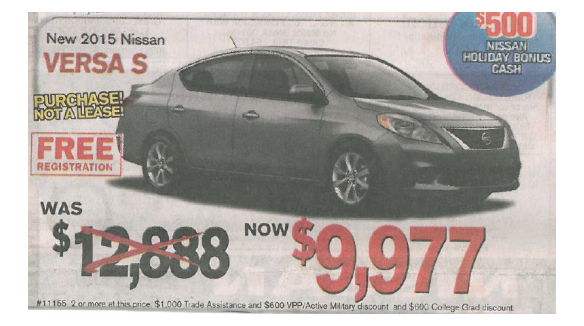Hyundai, Nissan Dealerships In Las Vegas Settle Deceptive Advertising Complaints
Back in March, federal regulators teamed up with their Canadian counterparts to crack down on auto dealers’ deceptive, fraudulent practices. While that operation culminated in six enforcement actions resulting in more than $2.6 million in judgments and consumer refunds, that wasn’t enough for the Federal Trade Commission, as the agency has now charged two Las Vegas auto dealers with similarly misleading practices.
The FTC announced this week that two auto dealers in Las Vegas have agreed to settle charges they used deceptive ads to promote the sale or leasing of their vehicles, including advertising heavily discounted prices that were not actually available to customers.
According to the complaints against TC Dealership (doing business as Planet Hyundai [PDF]) and JS Auotworld, Inc. (doing business as Planet Nissan [PDF]) the companies regularly ran ads that misrepresented the purchase price or leasing offers of their vehicles and the amount due at signing.
Since about 2014, Planet Hyundai has allegedly misled customers by prominently advertising a vehicle price for “$0 DOWN AVAILABLE.” But that deal wasn’t actually obtainable for many prospective buyers, as the fine print for the ad noted that customers must turn in a vehicle with a trade-in value of at least $2,500.
In another instance, the company promoted offers for vehicles as “50% OFF” in newspaper ads. The FTC charges that the deal wasn’t actually available to consumers unless they met a very specific set of requirements noted in the “minuscule” print at the bottom of the advertisement.
“A consumer can qualify for the advertised prices only if the consumer meets certain qualifications for incentives, rebates, or discounts, such as being a recent college graduate, being a member of the military, owning a currently registered Hyundai, or trading in a qualifying vehicle,” the complaint states.
Additionally, the FTC says the dealership failed to disclose other information in its ads such as whether or not a security deposit was required.
In the case of Planet Nissan, the FTC alleges the dealership prominently showcased ads of “PURCHASE! NOT A LEASE!” when, in fact, the vehicles shown were only available through leases.
Another allegedly deceptive ad includes the “NOW” pricing of vehicles. According to the FTC, the newspaper ads featured images depicting cars available at discounts with a prominent “NOW” price.
For example, one ad for a 2015 Nissan Versa shows the “WAS” price of $12,888 cut to “NOW” $9,977. While that would certainly be a great deal, the FTC says that the fine print in the ad suggests buyers must receive both a military and college discount to get the vehicle for the discounted price.
The owners of both Planet Nissan and Planet Hyundai have agreed to settle the FTC charges of deceptive advertising.
Under proposed consent orders, the dealerships are prohibited from misrepresenting the cost to purchase or lease a vehicle and are required to comply with the Consumer Leasing Act and Regulation M and the Truth in Lending Act and Regulation Z.
These cases are part of the Commission’s continuing efforts to protect consumers in the auto marketplace. The FTC provides a variety of resources for consumers buying or leasing a vehicle, including Are Car Ads Taking You For A Ride?
Two Las Vegas Auto Dealers Settle FTC Charges They Deceptively Advertised the Cost of Their Cars [Federal Trade Commission]
Want more consumer news? Visit our parent organization, Consumer Reports, for the latest on scams, recalls, and other consumer issues.




